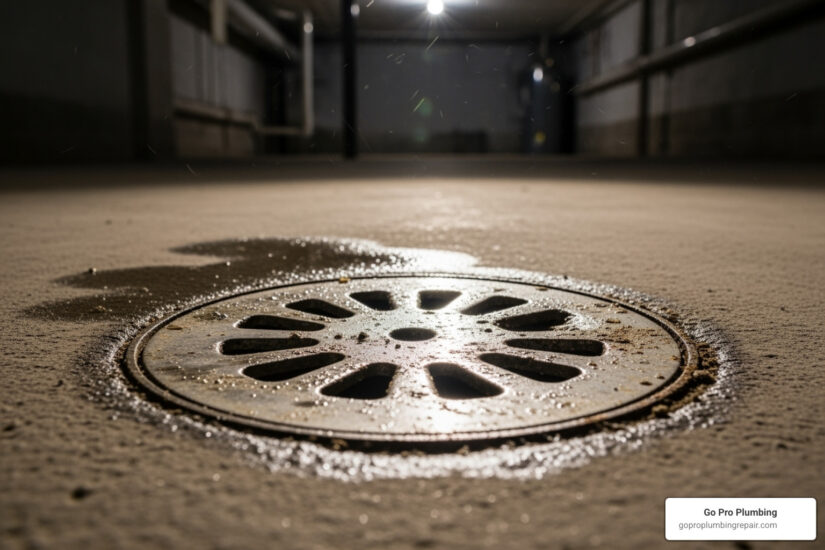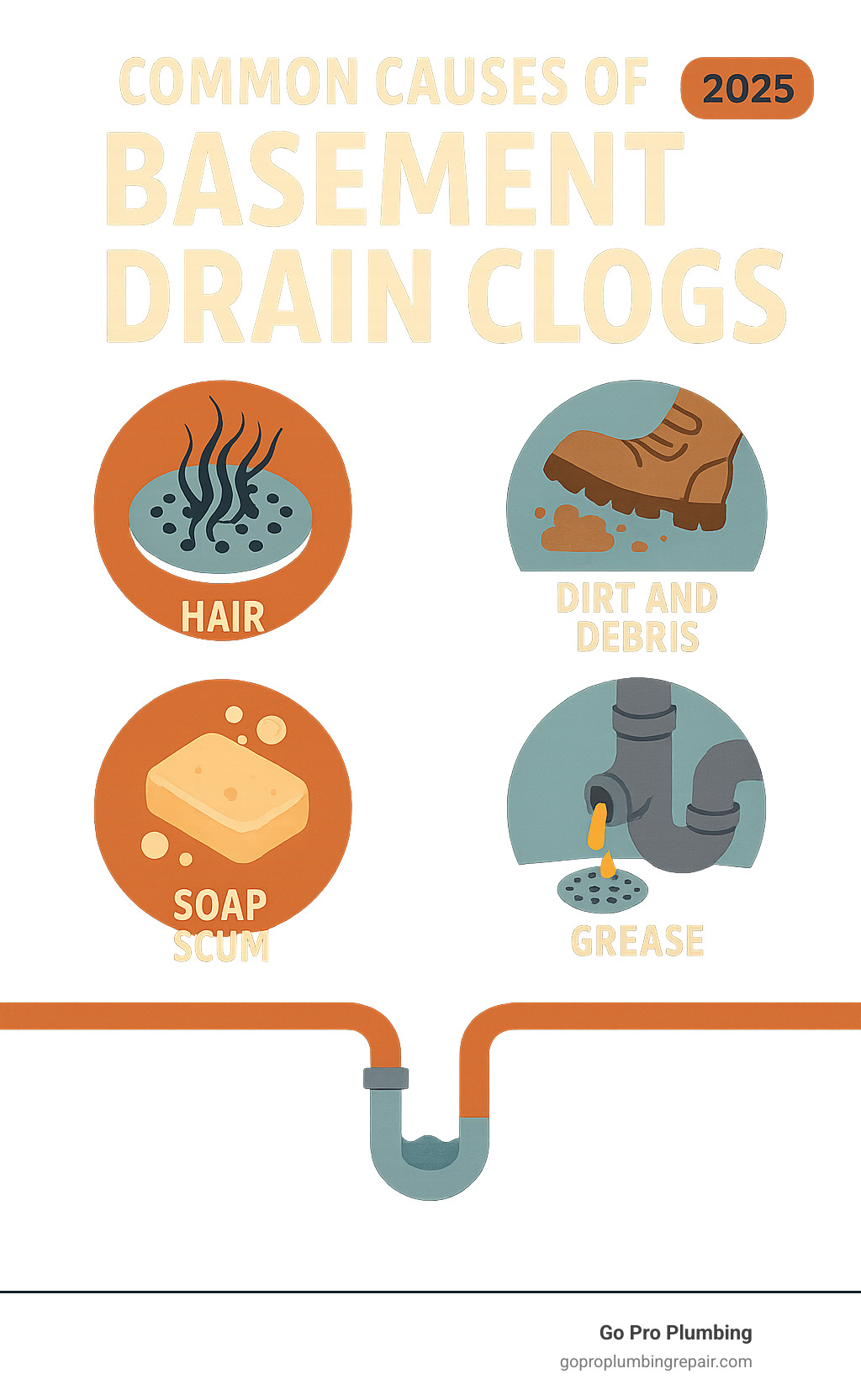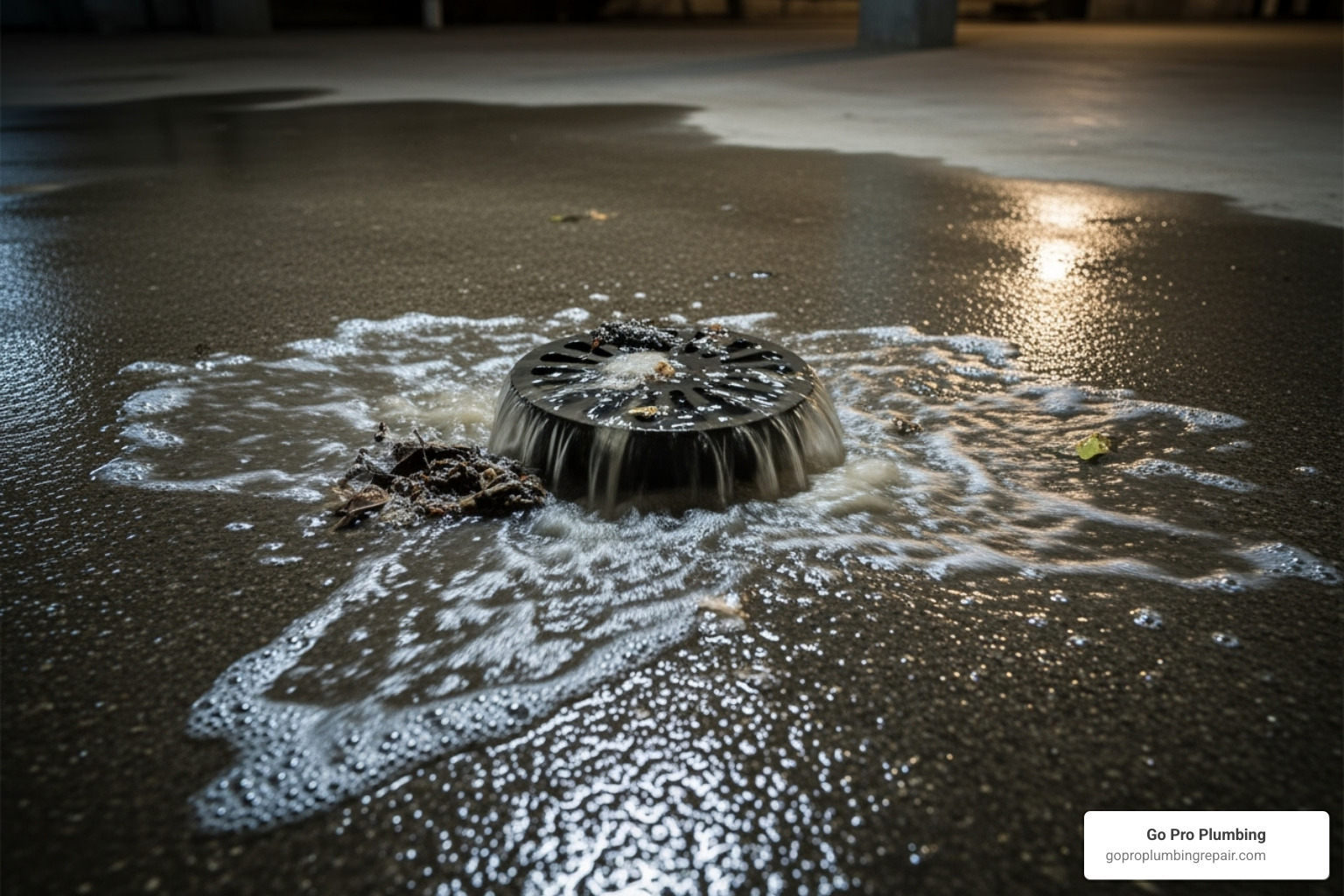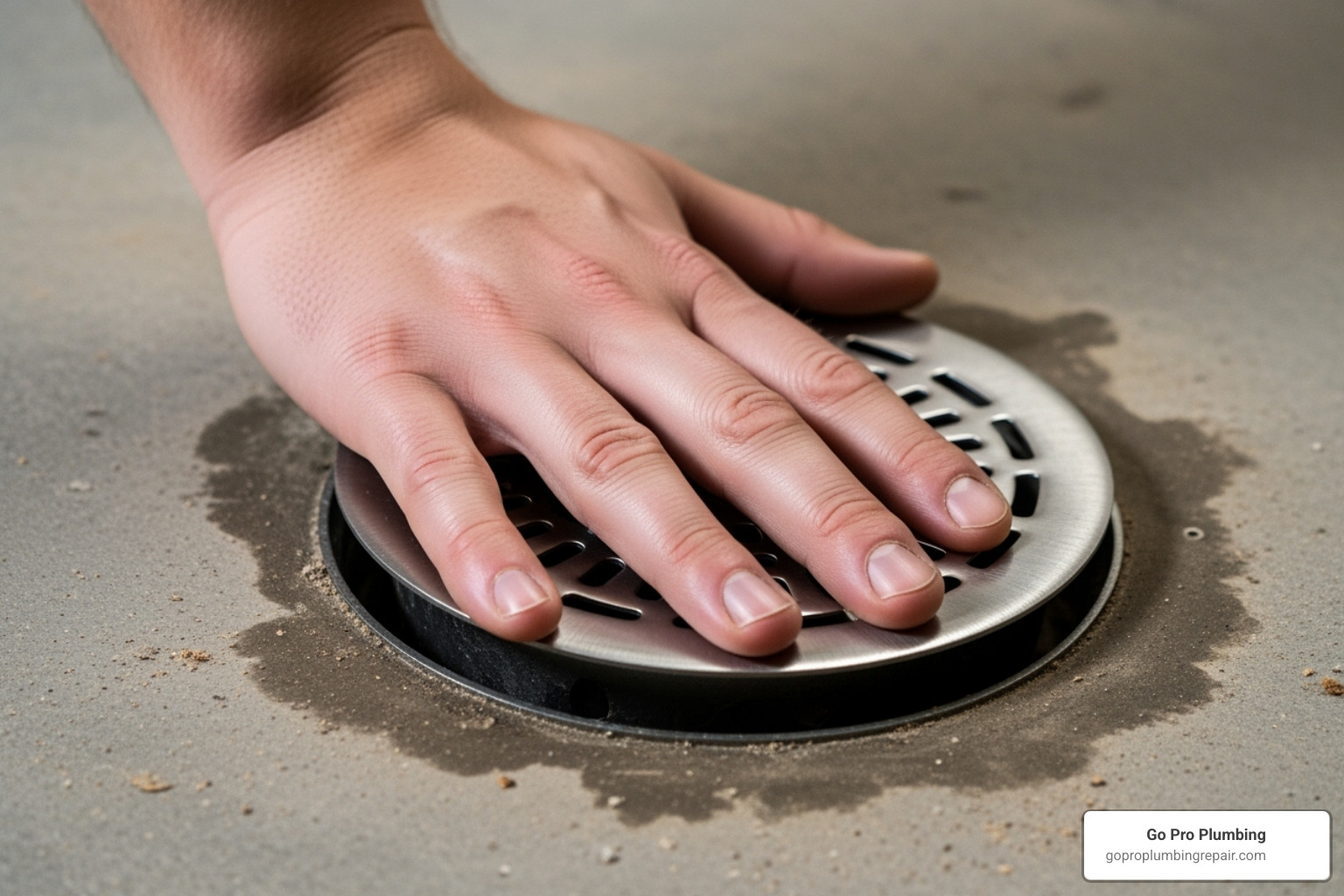No More Basement Floods: Best Drain Cleaner for Basement Floor Drains
By Brian on August 4, 2025

Your First Line of Defense Against Basement Flooding
The best drain cleaner for basement floor drain depends on your specific clog and pipe material. Here are the top options for Northern California homeowners:
Quick Answer:
- Regular maintenance: Baking soda + vinegar + hot water flush
- Organic buildup: Enzymatic cleaners (Bio-Clean, Green Gobbler)
- Physical blockages: Drain auger/snake + plunger
- Avoid: Chemical drain cleaners (can damage pipes and environment)
Your basement floor drain is critical for protecting your home from water damage. As one industry expert noted, “Basement floor drains are designed to carry water from appliances like washing machines, water softeners, and HVAC systems, as well as rainwater seepage, preventing flooding and water damage.”
When these drains clog, the consequences are severe. Standing water in your basement can lead to:
- Mould growth on fabrics and wood
- Structural damage as drywall softens and crumbles
- Ruined belongings like photos and artwork
- Lingering moisture that promotes ongoing mould issues
The most common culprits behind clogs are hair, dirt, soap scum, grease, and mineral deposits from hard water. Understanding these causes helps you choose the right cleaning approach.

Key best drain cleaner for basement floor drain vocabulary:
Why Is My Basement Floor Drain Clogged?
Your basement floor drain is often the lowest point in your home’s drainage system, making it a collection point for all kinds of debris. After years of helping Northern California homeowners, we’ve seen it all. Here are the most common reasons your drain gets overwhelmed.

- Dirt and Debris: Dust, pet hair, and small bits of leaves tracked in on shoes are the most common culprits. Unlike other drains, basement drains regularly deal with solid debris.
- Soap Scum and Grease: If your washing machine drains here, the combination of detergent, fabric softener, and oils from clothing creates a sticky film that traps other debris.
- Hair Buildup: Hair from laundry lint or pet grooming tangles with soap residue to form stubborn clogs that water can’t push through.
- Mineral Deposits: Hard water, common in some parts of Northern California, causes mineral buildup that gradually narrows your pipes, making it easier for clogs to form.
- Main Sewer Line Issues: Since the basement drain is the lowest exit point, problems in the main sewer line (like tree roots or major blockages) can force wastewater to back up into your basement.
- Heavy Rain: Intense storms can overwhelm municipal systems, causing water to flow back into your home through the basement drain.
Knowing when to find the best drain cleaner for basement floor drain starts with recognizing these warning signs:
- Slow Draining: Water that used to disappear quickly now pools around the drain.
- Foul Odors: A sewage smell often means the P-trap has dried out or organic matter is decomposing in the pipes.
- Gurgling Sounds: This indicates that air is trapped by a partial blockage, preventing water from flowing smoothly.
- Water Backups: This is the most serious sign. If using another fixture (like a toilet) causes water to appear in your basement drain, you likely have a main line blockage that needs immediate attention.
The Best Drain Cleaner for Basement Floor Drain: A Roundup of Methods
When faced with a stubborn basement floor drain, you have several options. Here’s our roundup of the best drain cleaner for basement floor drain methods, from gentle DIY solutions to powerful tools.
Best for Regular Maintenance: Natural & DIY Solutions
For minor clogs and routine maintenance, natural solutions are eco-friendly and safe for pipes.
- Baking Soda and Vinegar: This classic duo helps loosen minor clogs and control odors. Pour 1/2 cup of baking soda into the drain, followed by 1 cup of white vinegar. Let it fizz for 30-60 minutes, then flush with a bucket of hot (not boiling) water. This is best for keeping things from getting bad in the first place.
- Hot Water Flush: For simple grease or soap scum clogs, carefully pour a bucket of hot water into the drain to help dissolve sticky substances. Use caution with this method, as hot water could back up if the blockage is significant.
Best for Organic Buildup and Odors: Enzymatic Cleaners
For slow drains caused by organic matter (hair, soap scum), enzymatic drain cleaners are an excellent, gentle choice. They use beneficial bacteria and enzymes to digest organic waste.
- How They Work: Live bacteria cultures produce enzymes that break down organic materials into smaller particles. It’s a microscopic clean-up crew for your pipes.
- Benefits: They are non-corrosive, safe for all pipe types (including older plumbing), and septic-safe. They are effective at digesting grease, hair, and soap scum while eliminating odors at the source.
- Considerations: Enzymatic cleaners are slow-acting and require several hours or overnight to work. This makes them ideal for prevention and addressing recurring slow drains, but less suitable for immediate emergencies.
Best for Tough Physical Blockages: Manual Drain Tools
For tough, physical blockages, manual tools are often the most effective and safest option, offering immediate results without chemicals.
- Drain Auger (Snake): This is your best tool for removing stubborn clogs like hair. Insert the cable until you feel resistance, then crank the handle to break up or snag the clog. Pull it back slowly and flush the drain with hot water. For a more detailed guide, you can check A guide on using a drain snake.
- Plunger: A simple tool for dislodging clogs near the drain opening. Ensure there’s enough water to cover the cup, create a tight seal, and pump vigorously for 20-30 seconds. The vacuum created can dislodge the clog.
A Word of Caution on Chemical Drain Cleaners
We strongly advise against using chemical drain cleaners. While tempting, they pose significant risks.
- Pipe Damage: The heat generated by many chemical cleaners can warp or melt PVC pipes. The corrosive chemicals can also eat away at metal pipes over time, leading to weakness and cracks.
- Environmental Impact: These hazardous chemicals enter the wastewater system, harming the environment and potentially killing beneficial bacteria in septic systems.
- Safety Hazards: Chemical cleaners can cause severe burns to skin and eyes and produce toxic fumes. Never mix different chemical cleaners, as this can create highly toxic gases.
- When to Avoid: Avoid using chemicals in standing water or on complete clogs, as they will just sit in the pipe, causing damage. Always try mechanical methods (plunger, auger) first. If you’ve used a chemical cleaner and need to call a plumber, inform them immediately for their safety. For more details on drain standards, you can refer to Information on floor drain standards.
How to Prevent Future Basement Drain Clogs
An ounce of prevention is worth a pound of cure, and this is especially true for your basement floor drain. The best drain cleaner for basement floor drain strategy is preventing clogs before they start.

- Install Drain Covers and Strainers: This is the simplest game-changer. A simple strainer can catch hair, lint, and debris before they enter your pipes.
- Perform Regular Flushing: Pour a gallon of water down the drain once a month. This keeps the P-trap full, which blocks sewer gases, and helps flush away any lurking debris.
- Avoid Pouring Grease and Debris Down the Drain: Never dispose of grease, oil, coffee grounds, or food scraps in your floor drain. Be mindful of what goes in, especially if your washing machine drains there.
- Keep the Area Clean: Regularly sweep the floor around your drain to prevent dirt and debris from accidentally falling in.
- Check Your P-trap: Periodically remove the drain cover to inspect the P-trap. You can often spot and remove debris before it becomes a serious problem.
- Schedule Annual Professional Inspections: The gold standard of prevention is an annual inspection. A professional can use video cameras to spot hidden issues and hydro-jetting to blast away years of accumulated gunk, preventing major problems before they start.
These simple habits can save you significant time, money, and stress.
When to Skip the DIY and Call a Professional
Sometimes the best drain cleaner for basement floor drain is a phone call to an expert. While we encourage homeowners to try simple methods, there are clear signs that it’s time to call for professional help.
Here’s when you should put down the tools and pick up the phone:
- Recurring Clogs: If your drain keeps backing up despite your best efforts, there’s likely a deeper obstruction or pipe issue that DIY methods can’t resolve.
- Multiple Drains Backing Up: When your basement drain, sinks, and toilets all act up at once, you’re almost certainly dealing with a main sewer line blockage. This is not a DIY job.
- Sewage Smells or Backups: Raw sewage backing up into your basement is a health emergency. It indicates a severe blockage that requires immediate professional attention.
- DIY Methods Fail: If you’ve tried a plunger, natural cleaners, and even a drain snake with no success, the clog is likely too deep or too stubborn for household tools.
- Signs of Water Damage: If you notice foundation cracks or persistent dampness, a chronic clog might be contributing to a much larger structural problem.
Main line blockages caused by tree roots or collapsed pipes require specialized equipment like motorized augers or hydro-jetting machines. Our team uses advanced video camera inspection to diagnose the exact problem and high-pressure hydro-jetting to thoroughly clean your pipes.
| DIY Drain Cleaning Risks | Professional Service Benefits |
|---|---|
| Potential pipe damage from improper tool use or chemicals | Safe and effective clearing without pipe damage |
| Exposure to hazardous chemicals and fumes | Experienced professionals use proper safety protocols |
| Incomplete clog removal, leading to recurring issues | Thorough diagnosis and complete clog removal |
| Time-consuming and frustrating | Quick and efficient resolution, often same-day |
| Risk of water damage if DIY methods fail or worsen the problem | Prevention of further water damage and peace of mind |
| Lack of specialized tools for deep or complex clogs | Access to advanced equipment like hydro-jetters and cameras |
| May void warranties on certain appliances if not done correctly | Expert service, often with guarantees |
| Can miss underlying issues (e.g., pipe damage, tree roots) | Identification and resolution of root causes, not just symptoms |
The smartest move is knowing when you’re outmatched. For persistent clogs, trust our professional drain and sewer services. We’ll get your drain flowing and help you avoid a small issue turning into a major repair project.
Frequently Asked Questions about Basement Drain Cleaners
We get many questions from Northern California homeowners about their basement floor drains. Here are our honest answers to the most common ones.
Are chemical drain cleaners safe for my basement pipes?
We strongly advise against using chemical drain cleaners. While they promise a quick fix, they pose serious risks. The heat generated by caustic or acidic cleaners can soften or melt PVC pipes. For metal pipes, these corrosive chemicals can eat away at the interior surfaces over time, leading to leaks and costly repairs. Beyond pipe damage, they present safety hazards from chemical burns and toxic fumes. The best drain cleaner for basement floor drain issues is almost always a mechanical solution like a drain snake, or professional hydro-jetting for tougher clogs.
What are the signs my basement floor drain is about to clog?
Your drain will usually give you warning signs before a major backup. Look for:
- Slow water drainage: Water pools around the drain and takes longer than usual to disappear.
- Gurgling noises: Bubbling sounds indicate air is trapped by a partial clog.
- Puddles around the drain: This is a clear sign the drain can’t handle the incoming water flow.
- Unpleasant odors: Sewer gas smells can mean the P-trap has dried out, which can lead to clogs.
- Water backing up in other drains: This is a red flag for a main sewer line blockage.
Catching these signs early can help you avoid a basement flood.
How often should I clean my basement floor drain?
Regular maintenance is the key to prevention. We recommend a simple routine:
- Monthly: Pour a gallon of hot water down the drain. This flushes out minor buildup and keeps the P-trap full, which is essential for blocking sewer gases.
- Quarterly: Remove the drain cover and clear out any visible debris like hair, lint, or dirt.
- Annually: We highly recommend a professional cleaning and inspection. Our team can use video cameras to spot potential issues and hydro-jetting to thoroughly clean your pipes, clearing out years of buildup that DIY methods can’t reach. This proactive approach is the best way to prevent major clogs and backups.
Keep Your Basement Dry and Safe
A clogged basement floor drain can escalate from a minor issue to a disaster involving water damage and mold. The good news is that you have the knowledge to keep your drain healthy.
Prevention is your most powerful defense. Simple habits like using drain covers, avoiding grease, and performing a monthly water flush are highly effective. An annual professional inspection acts as an insurance policy, catching problems like tree roots or mineral buildup before they cause a flood.
Choosing the right method is crucial. For minor buildup, a baking soda and vinegar mix or an enzymatic cleaner works well. For stubborn hair or debris, a drain auger or plunger is often the most effective and safest best drain cleaner for basement floor drain solution because it won’t harm your pipes.
Recognizing when to call a professional is just as important. Recurring clogs, multiple backed-up drains, or the smell of sewage are clear signs to step back and call for help.
At Go Pro Plumbing, our mission is to keep Northern California basements dry and homeowners stress-free. We empower you to handle small issues, but we’re always here with advanced tools and expertise when you need backup. A flooded basement is a major disruption, and we’re committed to getting your home back to normal quickly.
Your basement should be a useful, dry space, not a source of worry. For persistent clogs, trust our professional drain and sewer services. We’re ready to help keep your home flowing smoothly!
